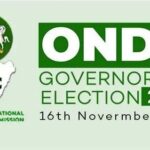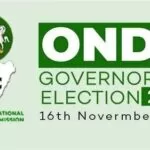
Today, Nov. 16, a total of 1,793,914 electorates who collected their Permanent Voter Cards from the Independent National Electoral Commission (INEC) are expected to either retain Lucky Aiyedatiwa as the governor of Ondo or elect a new leader to govern the affairs of the Nigerian southwestern state for the next four years.
Although 17 political parties are contesting, the majority of the voters in the state have their attention on two contestants. They are candidates of the All Progressives Congress (APC) Aiyedatiwa, the incumbent governor who assumed office in December 2023 following the death of ex-Governor Rotimi Akeredolu and his counterpart in the Peoples Democratic Party (PDP), Agboola Ajayi, who is also a former deputy governor in the state.
On his part, the electoral umpire’s chairman, Mahmood Yakubu, has assured residents and stakeholders of INEC readiness for the poll, saying “the commission, in collaboration with security and law enforcement agencies, has put comprehensive security measures in place to safeguard voters, INEC staff, observers, and media personnel across all polling and collation centres.”
Ondo state started off-cycle elections after the 2007 general elections when the then Labour Party candidate, Olusegun Mimiko, challenged the re-election of the PDP’s Olusegun Agagu in court and won. Mimiko was sworn in as governor of Ondo state in February 2009 and the next election in the state was held in late 2012. It set the state off the general election cycle.
While Nigeria’s Electoral Act opposes violence connected to elections and is punishable with up to four years imprisonment, or a fine of ₦500,000 or both, there have been previous events where politicians and political thugs showed a lack of respect for the law.
For the election expected to take place today, civil society organisations have raised concerns over escalating political desperation and reports of violence and intimidation in the state.
In its pre-election assessment statement, Yiaga Africa, a non-profit organisation promoting participatory democracy, human rights and civic participation, notes that the desperation is evident in various ways, including heightened rhetoric, aggressive campaigning, the spread of misinformation, and personal attacks aimed at undermining opponents.
Also, some party supporters became less tolerant and engaged in physical attacks in places like Akoko North East, Akoko South West, Akure North, Ifedore, Irele, and Ondo East LGAs.
The Centre for Democracy and Development (CDD-West Africa) said in its assessment that the upcoming election in Ondo underscores the need for vigilance, with Ondo’s history of violence from non-state actors such as cult groups, political thugs, and criminal syndicates engaged in kidnapping and armed robbery, urging that “historical trends of election violence in the state should not be overlooked.”
Will heavy security help?
As INEC continues the distribution of sensitive materials for the conduct of the election to the 18 local government areas, there is heavy security presence across the state.
Nigeria’s Inspector General of Police, Kayode Egbetokun, said he has deployed 22,239 officers to the state. While he banned the Amotekun, a local security outfit, the Nigerian Security and Civil Defence Corps (NSCDC) are supporting the police with 6,000 officers.
Also, the Defence Headquarters announced the deployment of soldiers to the border areas and flashpoints in a coordinated effort to support the Police Force and ensure the smooth conduct of the election.
According to the Director of Defence Media Operations, Major General Buba Edward, the deployment is meant to keep troublemakers at bay. “Troops are deployed in strength to assist the police in Ondo State for the off-cycle governorship election on November 16. The military presence is to provide security, enabling voters to cast their ballots without fear of harassment,” his statement reads.
Even with the assurance of neutrality, experience in the past shows that heavy deployment of security officials does not guarantee credible or peaceful elections in Nigeria, hence no one is certain of what will happen today.
But many Nigerians are hopeful that police will provide a level playing field for all candidates.
Stakeholders advise INEC, security agents
Speaking in Akure on Thursday, Ezenwa Nwagwu, chairman for the 2024 Ondo election mission, Yiaga Africa, called on INEC to avoid partiality and favouritism during the poll.
“We urge the Independent National Electoral Commission (INEC) to enhance coordination and communication with the transport companies and unions that provide logistics support,” he said. “It is essential to ensure the timely delivery of materials to the registration area centers (RACs) and to facilitate the early deployment of materials and personnel to polling units on election day. This approach will help to address the issue of late commencement of polls that has been observed in previous elections.”
Also, CDD-West Africa Director, Dauda Garuba said he expects INEC to live up to its mandate and responsibility.
“CDD-West Africa remains committed to rigorous monitoring and reporting of all aspects of the process to ensure a transparent, fair, and accountable electoral outcome,” he said.
Today, 1,793,914 registered voters in Ondo, Nigeria, will decide whether to retain the incumbent governor, Lucky Aiyedatiwa of the All Progressives Congress, or elect Agboola Ajayi of the Peoples Democratic Party as the new governor.
While INEC has assured a secure polling process with a heavy deployment of security forces, concerns from civil society organizations have been raised about potential violence and intimidation due to increasing political desperation and historical trends of election-related violence.
The Inspector General of Police has deployed 22,239 officers, and 6,000 NSCDC personnel are supporting the police in Ondo, along with military presence to maintain order. However, historical trends suggest heavy security does not always ensure peaceful elections.
Stakeholders emphasize the need for INEC to remain impartial and improve logistical coordination to ensure timely commencement of polls, while monitoring organizations like Yiaga Africa and CDD-West Africa commit to transparent election monitoring.
